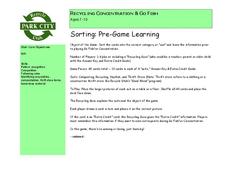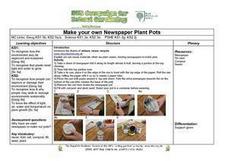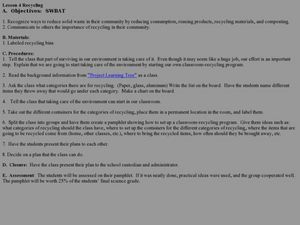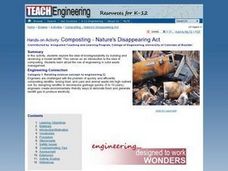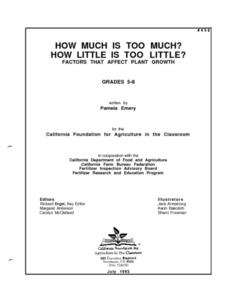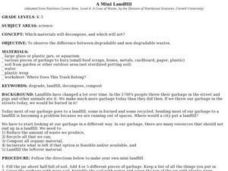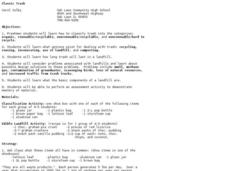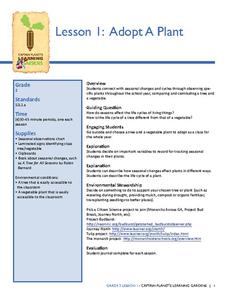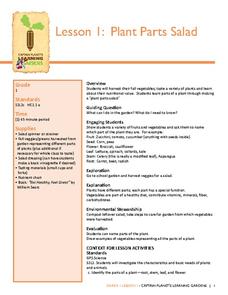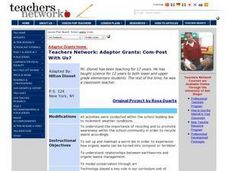Curated OER
Trash Disposal Choices
Students determine the differences between reusable, compostable and recyclable trash.
Curated OER
How Long Until Dirt
Third graders examine the difference between composting and wasting food. They problem-solve what to do about leftovers after lunches so good food doesn't go to waste.They study food storage techniques that are environmentally friendly...
Curated OER
A Shredding We Will Go
Students take charge of a recycling project . In this environmental issues lesson, students manage a paper recycling project and use compost made from the recycled paper to beautify trees.
Curated OER
Recycling Concentration & Go Fish
Learners play a game based on concentration or memory to place recyclable items into one of 4 groups. In this recycling lesson, students work in groups of 1-4 to place cards with pictures of various items into a Composting, Recycling,...
Curated OER
Make Your Own Newspaper Plant Pots
Students make plant pots out of newspaper as part of a recycle, reuse, and reduce lesson. In this recycling lesson, students fold a piece of newspaper to make a pot in which to start plants. They fill it with compost and plant seeds.
Curated OER
Organic and Inorganic Recycling
Students examine their role in polluting the environment and discuss the importance of recycling. In groups, they place earthworms into compost piles to observe why they are considered natural recyclers. They also practice sorting a...
Curated OER
Recycling: lesson 4
Students create plans in order to reduce solid waste. For this recycling lesson plan, students discuss and come up with plans to reduce consumption, reusing products, recycling materials, and composting and then present their plans to...
Curated OER
The Effects of Trash and Garbage On the Environment
Students recognize the importance of solid waste management. In this science lesson plan, students analyze individual solid waste management habits as they enhance their knowledge of solid waste disposal and the recycling process.
Curated OER
Willie the Worm
Young scholars explore Earth science by participating in a compost activity in class. In this worm lesson, students discuss the importance of worms in the creation of plants. Young scholars cut out pieces from a print out to assemble a...
Curated OER
Composting -- Nature's Disappearing Act
Studenst work together to discover the concept of biodegradability. They build a model of a landfill and how different items decompose. They examine how engineers use this information for better waste management.
Curated OER
How Much Is Too Much? How Little Is Too Little?
Students perform a series of experiments which show that plants require nutrients in certain quantities. They also cooperatively read materials on the nutrient requirements of plants, fertilizers, composting, and soil management, and...
Curated OER
A MINI LANDFILL
Students observe the difference between degradable and non-degradable wastes. They create their own landfill in a jar by adding four or five pieces of garbage and then covering it with dirt and water. They make observations on what they...
Curated OER
Classic Trash
Students investigate how trash is classified and the options to deal with it. In this trash and recycling lesson, students perform an activity to classify trash into organic, renewable/ recyclable, now renewable/recyclable and...
Curated OER
Talkin' Trash (All About Landfills)
Students investigate the types of waste created by people and identify various options for trash disposal. They read and discuss a handout about what a landfill is and the different types of trash, match types of trash with the proper...
Captain Planet Foundation
Adopt-A-Plant
Note the way that plants change during the season by adopting a plant on your school campus. After your class chooses their plant, they research the plant's needs, how it differs from other plants, find ways to support their plant's...
Captain Planet Foundation
Plant Parts Salad
How are vegetables beneficial to a healthy diet? Have kids examine different types of vegetables, such as zucchini, broccoli, and carrots, and determine which parts of the plant they represent. Then, they taste the vegetables as a...
Captain Planet Foundation
Sorting Out Soils
Sift through soil and learn about why it's important for organic processes. After discussing what makes up soil, such as the living organisms and what types of soil have more nutrients, kids sample layers of mulch and deeper soil to...
Forest Foundation
Forest Health
Young foresters examine the strategies, like prescribed burns and thinning, that are employed to ensure healthy forests.
Kenan Fellows
Sustainability: Learning for a Lifetime – Soil
Do great gardeners really have green thumbs—or just really great soil? Environmental scholars discover what makes Earth's soil and soil quality so important through research and experimentation. Learners also develop an understanding of...
Curated OER
Com-Post With Us? Learn About Recycling While Having Fun
Young scholars examine the importance of recycling to help the environment. In groups, they make a compost bin on the school grounds recording how the material changes from week to week. They collect other materials for recycling like...
Curated OER
Recycling Garden Waste
Learners experience how to make compost. This lesson is ongoing with periodic checks and maintenance. They select a piece of ground around the school or around their homes to establish a compost pile. Organic materials are utilized...
Curated OER
Com-Post With Us?
Students discuss the importance of reducing, recycling and reusing materials to help the environment. As a class, they create a worm bin and observe how it turns material in to compost. They use the internet to research the...
Curated OER
Compost Tag
Students identify biodegradable items. In this environmental lesson plan, students participate in a game of tag. A student's name is called out along with a biodegradable item and the student is tossed a ball.
Curated OER
A Worm World
Young scholars maintain a compost bin and build a worm observatory. They design experiments relating to worms and record observations in a worm journal.



